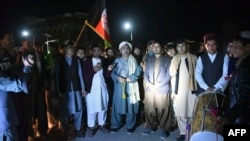The city of Kandahar in southern Afghanistan was once the center of the Taliban's Islamist government.
But Kandahar is slowly changing into an energetic city of 700,000. It has busy eateries, universities with both men and women and even a women's exercise center.
Young men gather each night at the Arena club, a popular gathering place in the city. They play games, watch sporting events or smoke tobacco. Such activities were almost unthinkable when the Taliban ruled Afghanistan from 1996 to 2001.
"There was no such place in Kandahar when we built it and there is still no other such place in the [entire] south," said 30-year-old Nazir Ahmad, Arena's owner.
Under Taliban rule, all kinds of entertainment were banned, from music and movies to kite flying.
But the city's young people fear such freedoms may be lost again. The Taliban have increased its attacks in the area even during peace talks with the government.
Many in Kandahar still remember the public beatings and executions in open areas of the city.
But Kandahar has experienced a huge change in recent years. Women can now be seen riding on motorcycles. Families enjoy eating together outdoors. Several city spaces have fountains that light up when the sun goes down. Street sellers serve hot Afghan food into the night.
But the Taliban appear energized to fight back after a deal with the United States that secured the withdrawal of all foreign forces by May. They have strengthened their campaign against Afghan forces in rural areas.
'What kind of peace?'
Afghanistan now faces the possibility of giving back some power to the Taliban, which U.S.-led forces have been unable to defeat for 19 years.
The Taliban claim to control or contest more than half of the country, including large areas across southern Afghanistan.
Kandahar city remains firmly in the control of government forces. But the Taliban are not far away.
"I hope the Taliban have changed and will let this club remain open," Arena club’s owner, Ahmad, told reporters with Agence France-Presse.
Cafe Delight is another popular eatery in the city. The cafe permits entry to female customers — something that is still uncommon in the city.
"What kind of peace would it be if they closed down our cafe?" asked the café’s owner, Mohammad Yasin.
"We will not comply if the Taliban tell us not to accept female customers,” he added.
When the Taliban ruled Afghanistan, girls were banned from school. Women accused of crimes such as adultery were stoned to death at sports stadiums.
But since the Taliban were ousted, women have made great progress in cities. They have taken jobs in the media, politics and even the country’s security forces.
Changed Taliban?
But some women in Kandahar fear they will lose some of their hard-won freedoms if the Taliban returns to power.
"There was only one school for girls and now we have 15," said Mariam Durrani. The 36-year-old has established several projects for women -- including an education center, a radio station and an exercise center where some women secretly attend classes.
"There is a possibility that the Taliban may return and that restrictions could be imposed on women again," Durrani said.
Others are more hopeful, like Shukria Ali. She works at Radio Merman, the women-led station that Durrani started. The station recently received a prize from the press freedom group Reporters Without Borders.
“Maybe the Taliban have changed," Ali told AFP.
Weeks after Ali spoke with AFP reporters, the country experienced a number of deadly and unclaimed attacks on reporters.
I’m Jonathan Evans.
Jonathan Evans adapted this story for Learning English based on a report from AFP. Ashley Thompson was the editor.
_______________________________________________________________
Words in This Story
adultery – n. sex between a married person and someone who is not that person's wife or husband
stadiums – n. a large usually outdoor structures with rows of seats for spectators at sports events





